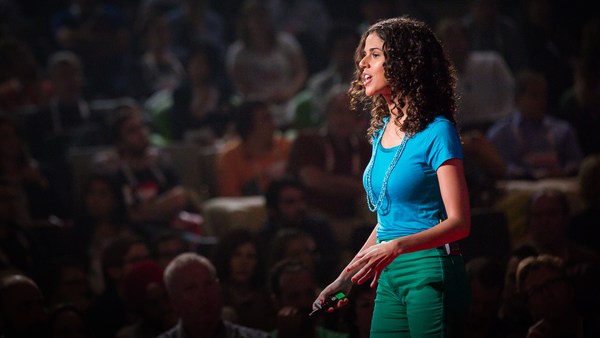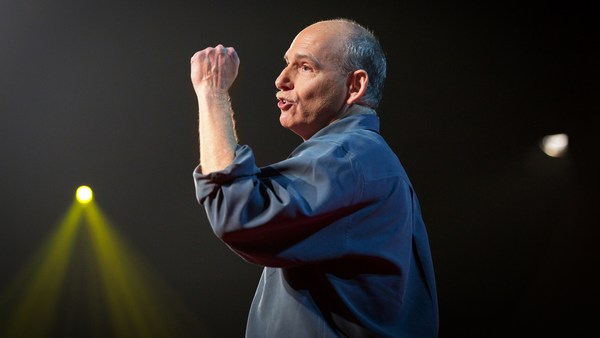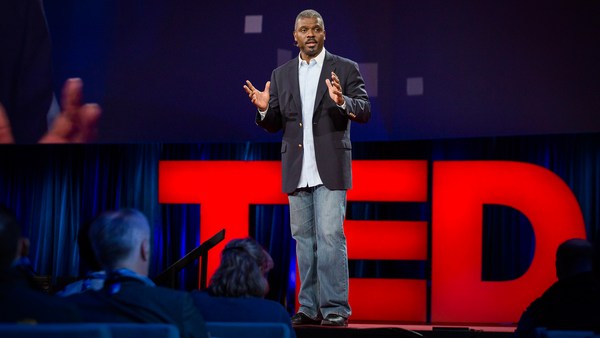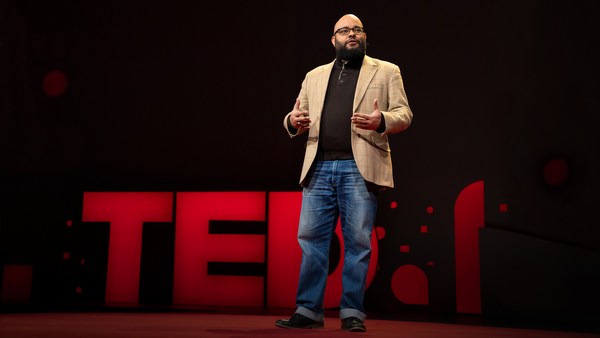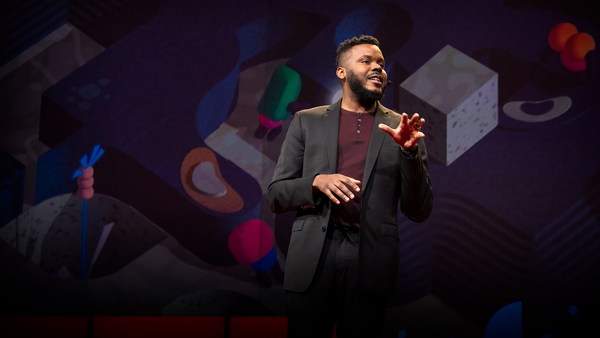I have been a police officer for a very, very long time. And you see these notes in my hand because I'm also a black preacher.
(Laughter)
And if you know anything about black preachers, we'll close, and then we'll keep going for another 20 minutes.
(Laughter)
So I need this to keep pushing this thing forward. I've been a police officer for a very long time, and I mean I predated technology. I'm talking about before pagers.
(Laughter)
Laugh if you want to, but I'm telling the truth. I predate War on Our Fellow Man -- I mean, War on Drugs. I predate all of that. I predate so much and I've been through ebbs and flows and I've been through good and bad times, and still I absolutely love being a police officer. I love being a police officer because it's always been a calling for me and never a job.
And even with that, my personal truth is that law enforcement is in a crisis. It's an invisible crisis, and it has been for many, many years. Even though we in law enforcement say, "You know what? We can't arrest our way out of this." We say in law enforcement things like, "Yeah, it's illegal to profile." You know what? In law enforcement, we even agree that we have to adopt this thinking and become more oriented to community policing. And yet all the while, still, we continue in the same vein, the same vein that contradicts everything that we just admitted.
And so that's the reason for me, several years ago. Because I was tired of the racism, I was tired of discrimination, I was tired of the "-isms" and the schisms. I was just so tired. I was tired of the vicious cycle, and I was tired of it even in the beloved agency in the department that I still love today. And so my wife and I, we sat down and we decided and we targeted a date that we would retire. We would retire and I would go off into the sunset, maybe do ministry full time, love my wife a long time. Y'all know what I'm talking about.
(Laughter)
But we decided that I would retire. But then there was a higher power than I. There was a love for the city that I loved, that I grew up in, that I was educated in -- a city that pulled my heart back into the system. So we didn't retire. We didn't retire and so what happened was, over the next -- I would say, 18 months, 19 months, I had this passion to implement some radical policing. And so now, over the next 19 months, I shifted, and I transcended from being a drug sergeant -- ready to retire as a drug sergeant -- and went from level to level to level, until I find myself as a district commander, commander of the worst district in Baltimore city. We call it the Eastern District, the most violent district, the most impoverished district -- 46 percent unemployment in that district. National rating at that time, national rating, the AIDS and the tuberculosis [rating], was always on the top 10 list for zip codes for cities across the nation, or just zip codes across the nation. The top 10 -- I didn't say state, I didn't say city -- that little neighborhood.
And I said, you know what? We gotta do something different. We gotta do something different. We gotta think radical. We gotta think outside the box. And so in order to bring change that I desperately wanted and I desperately felt in my heart, I had to start listening to that inner spirit. I had to start listening to that man on the inside that went against everything that I had been trained to do.
But we still did it. We still did it because we listened to that inner spirit, because I realized this: if I was to see real police reform in the communities that I had authority over for public safety, we had to change our stinkin' thinkin'.
We had to change it. And so what we did is we started to think holistically and not paramilitarily. So we thought differently. And we started to realize that it could never be and never should have been us versus them. And so I decided to come to that intersection where I could meet all classes, all races, all creeds, all colors; where I would meet the businesses and the faith-based, and the eds, the meds, and I would meet all the people that made up the communities that I had authority over.
So I met them and I began to listen. See, police have a problem. Off the top, we want to bring things into the community and come up with these extravagant strategies and deployments, but we never talk to the community about them. And we shove them into the community and say, "Take that." But we said we'd get rid of that stinkin' thinkin', so we talked to our communities. We said, "This is your community table. We'll pull up a chair. We want to hear from you. What's going to work in your community?" And then some great things started to happen.
See, here's the thing: I had to figure out a way to shift 130 cops that were under my tutelage from being occupiers of communities to being partners. I had to figure out how to do that. Because here's the crazy thing: in law enforcement, we have evolved into something incredible. Listen, we have become great protectors. We know how to protect you. But we have exercised that arm so much, so very much. If I was a natural police department and I represented a police department, you would see this incredible, beautiful, 23-inch arm.
(Laughter)
It's pretty, ain't it? It's cut up. No fat on it. Mmm it look good. It just look good!
(Laughter)
That's a great arm -- protection! That's who we are, but we've exercised it so much sometimes that it has led to abuse. It's led to coldness and callousness and dehumanized us. And we've forgotten the mantra across this nation is to protect and serve. Y'all don't know that? Protect and serve.
(Laughter)
So you look at the other arm, and then you look at it and ... there it is.
(Laughter)
You know, it's kinda weak. It looks sickly. It's withering and it's dying because we've invested so much in our protective arm. But we forgot to treat our communities like they're our customers; like they're our sons and daughters, our brothers and sisters, our mothers and fathers. And so somehow, along the way, we've gotten out of balance. And because we are a proud profession, it is very hard for us to look in the mirror and see our mistakes. It's even harder to make a change.
And so, as I try to hurry and get through this, I need to say this: it's not just law enforcement, though. Because every one of us makes up a community. Everybody makes up a community. And as communities -- can I say this? -- we have put too much responsibility on law enforcement. Too much.
(Applause)
And then we have the audacity and the nerve to get upset with law enforcement when we take action. There is no way in the world that we, as a community, should be calling the police for kids playing ball in the street. No way in the world that we should be calling the police because my neighbor's music is up too loud, because his dog came over to my yard and did a number two; there's no way we should be calling the police. But we have surrendered so much of our responsibility. Listen, when I was a little boy coming up in Baltimore -- and listen, we played rough in the street -- I ain't never see the police come and break us up. You know who came? It was the elders. It was the parental figures in the community. It was those guardians, it was that village mentality. They came and said, "Stop that!" and "Do this." and "Stop that." We had mentors throughout all of the community.
So it takes all of us, all of us. And when I say community, I'm talking about everything that makes up a community, even -- listen, because I'm a preacher, I'm very hard on the churches, because I believe the churches too often have become MIA, missing in action. I believe they have shifted over the last 10, 20 years from being community churches, where you walk outside your door, round the corner and you're in church. They shifted from that and became commuter churches. So you now have churches who have become disconnected by default from the very community where they're planted. And they don't take care of that community.
I could go on and on, but I really need to wrap this up. Community and policing: we've all lost that precious gift, and I call it relational equity. We've lost it with one another. It's not somebody else's fault -- it's all of our fault. We all take responsibility in this. But I say this: it's not too late for all of us to build our cities and nation to make it great again. It is never too late. It is never too late. You see, after three years of my four-and-a-half-year commandship in that district, three years in, after putting pastors in the car with my police because I knew this -- it's a little secret -- I knew this: it was hard to stay a nasty police officer while you're riding around with a clergy.
(Laughter)
(Applause)
You'd be getting in and out of the car, looking to your right, talking about: "Father, forgive me, for I have sinned," all day long -- you can't do it! So we came up with some incredible initiatives, engagements for our community and police to build that trust back. We began to deal with our youth and with those who we consider are on the wrong side of the fence. We knew we had an economic problem, so we began to create jobs. We knew there was sickness in our community and they didn't have access to proper medical care, so we'd partner up. We got to that intersection and partnered up with anybody that wanted to partner with us and talked about what we needed holistically, never thinking about the crime. Because at the end of the day, if we took care of the needs of the people, if we got to the root cause, the crime would take care of itself. It would take care of itself.
(Applause)
And so, after three years of a four-and-a-half-year stint, we looked back and we looked over and found out that we were at a 40-year historical low: our crime numbers, our homicides -- everything had dropped down, back to the 1970s. And it might go back further, but the problem is, we only started keeping data since 1970. Forty-year crime low, so much so, I had other commanders call me, "Hey Mel, whatcha doin', man? Whatcha doin'? We gotta get some of that!"
(Laughter)
And so we gave them some of that. And in a short period of time, the city went to a 30-year crime low. For the first time in 30 years, we fell, Baltimore city, to under 200 homicides -- 197 to be exact. And we celebrated, because we had learned to become great servers, become great servers first.
But I gotta tell you this: these last few years, as much as we had learned to become great proactive police officers and great relational police officers rather than reactive, these last years have disappointed me. They have broken my heart. The uprising still hurts. It still hurts my heart, because truly I believe that it should've never happened. I believe it should've never happened if we were allowed to continue along the vein that we were in, servicing our community, treating them like human beings, treating them with respect, loving on them first. If we continued in that vein, it would've never happened. But somehow, we went back to business as usual.
But I'm excited again! I'm excited again, because now we have a police commissioner who not only talks about community policing, but he absolutely understands it, and more importantly, he embraces it. So I'm very excited now. Listen, I'm excited about Baltimore today, because we, as many cities, I believe shall rise from the ashes. I believe -- I truly believe --
(Applause)
that we will be great again. I believe, as we continue to wrap arms and continue to say, "We're in this together," because it's not just an intersection: once we meet, we now gotta get on the same path for the same goals, and this city will become great again. This nation will become great again. Because we have the same goal: we all want peace. We all want respect for one another. We all want love. And I believe we are back on that road, and I'm so excited about it.
So listen, I thank you for giving me a few minutes of your time.
God bless you all.
(Applause)
God bless you.
(Applause)
